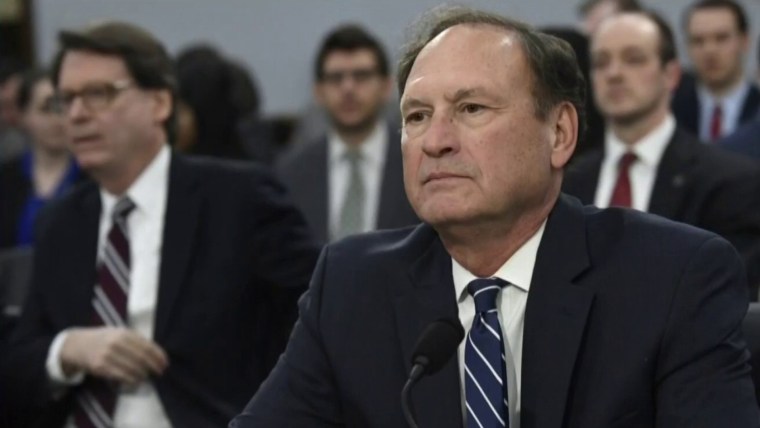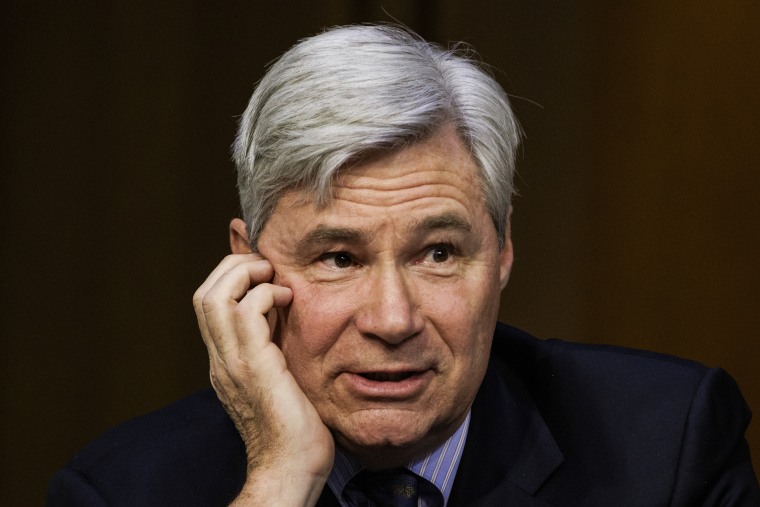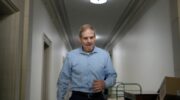WASHINGTON — Sen. Sheldon Whitehouse, D-R.I., is demanding that Chief Justice John Roberts take action over an unusual interview in which conservative Justice Samuel Alito questioned whether Congress has the power to impose ethics rules on the Supreme Court.
Whitehouse’s complaint, submitted Monday, focuses on a July 28 interview published by The Wall Street Journal, conducted in part by the conservative lawyer David Rivkin, in the wake of recent news articles raising questions about Supreme Court ethics.
“No provision in the Constitution gives them the authority to regulate the Supreme Court — period,” Alito said.

Alito ‘engaged’ with ProPublica interview about disclosure and recusal, reporter says
Whitehouse said in his letter that Alito’s comments bear on legislation he has sponsored to impose an ethics code. Whitehouse wrote the letter to Roberts in part to highlight how the Supreme Court does not have a formal mechanism for handling ethics complaints.
Alito’s comments violate the code of conduct lower court judges follow in part because he gave an opinion about a legal issue that might come before the court, Whitehouse said. Justices have in the past said that although the code of conduct does not specifically apply to the Supreme Court, they use it as a reference on ethics issues.
“Making public comments assessing the merits of a legal issue that could come before the Court undoubtedly creates the very appearance of impropriety these rules are meant to protect against,” Whitehouse said in the letter.
He also highlighted Rivkin’s role, noting that he represents the conservative legal activist Leonard Leo, whom the Judiciary Committee has sought testimony from on ethics questions.
The Wall Street Journal interview came after a ProPublica story revealed Alito had taken a luxury vacation in Alaska with a Republican donor who had business interests before the court. Leo was another guest on the trip.
 Sen. Sheldon Whitehouse, D-R.I.Samuel Corum / Bloomberg via Getty Images file
Sen. Sheldon Whitehouse, D-R.I.Samuel Corum / Bloomberg via Getty Images file
“The timing of Justice Alito’s opining suggests that he intervened to give his friend and political ally support in his effort to block congressional inquiries,” Whitehouse said.
A Supreme Court spokeswoman did not immediately respond to a request seeking comment from Roberts and Alito. Judicial ethics issues are overseen by the U.S. Judicial Conference, the policymaking arm of the judiciary, which Roberts heads.
Supreme Court members have been facing renewed scrutiny for alleged ethics lapses after a ProPublica report detailed Justice Clarence Thomas’ acceptance of trips from Harlan Crow, a Republican donor, which he had not disclosed in his annual financial disclosure reports.
In his latest financial report, issued last week, Thomas for the first time disclosed trips funded by Crow. That followed a change in disclosure rules this year.
In a pre-emptive response to the Alaska trip story, also published by The Wall Street Journal, Alito rejected the notion that he had done anything wrong, saying the travel was not reportable under the disclosure rules at the time.
The court could adopt its own ethics rules without congressional intervention, but justices have indicated that although it has been discussed, there is no consensus about how to move forward.
In April, the justices issued a statement saying they “reaffirm and restate” their commitment to ethics principles.




